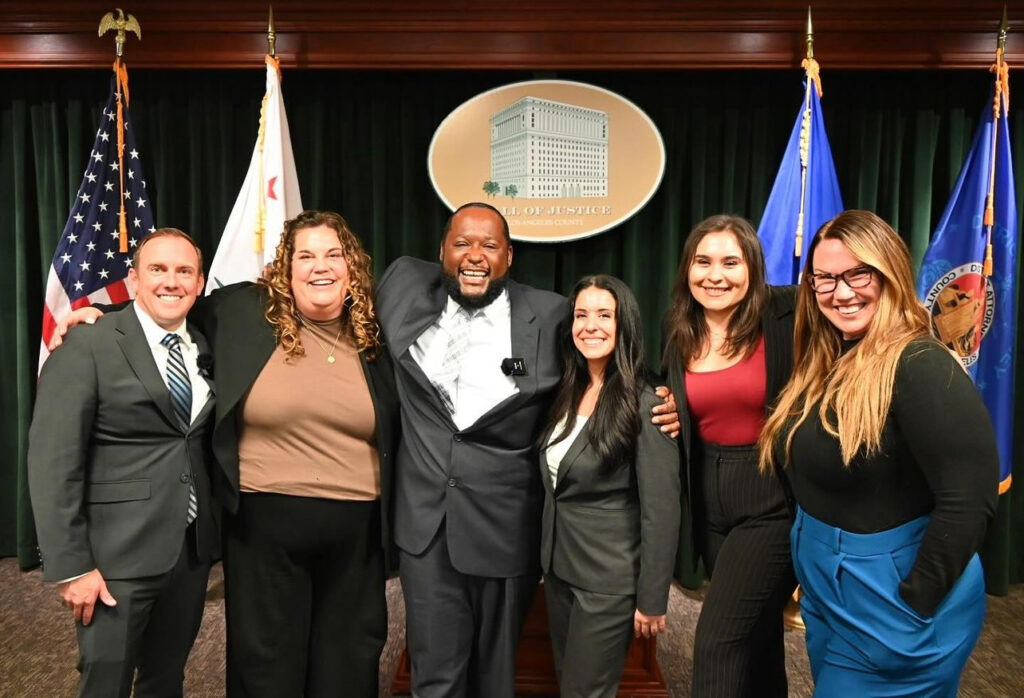
Empowering the Innocent: The Third Mission of The Innocence Center

The Innocence Center
Staff Attorney and NLD Vice Chair
The Innocence Center (“TIC”) stands as a beacon of hope and justice, tirelessly working to free innocent individuals from the confines of wrongful imprisonment. This independent non-profit law firm employs cutting-edge technology and innovative strategies, including the use of Artificial Intelligence and automation, to identify and pursue cases of wrongful conviction. Beyond its critical role in freeing the innocent and educating the public about the causes of wrongful convictions, TIC is profoundly committed to supporting their clients as they navigate the daunting process of reentry into society.
According to the United States Department of Justice, over 10,000 formerly incarcerated people are released from state and federal prisons each week, culminating in more than 650,000 people annually. In California, numerous reentry programs and services strive to assist these individuals in rebuilding their lives, focusing on areas such as employment, housing, education, and mental health. However, those who have been wrongfully convicted face unique and compounded challenges, necessitating a tailored approach to their reentry.
With decades of collective experience in innocence work, the team at TIC has successfully freed more than 40 individuals who, together, have spent over 560 years wrongfully incarcerated. Each client’s journey has provided invaluable insights into the unique challenges faced by the wrongfully convicted as they transition back into society. These experiences have strengthened TIC’s commitment and emphasized the critical importance of its third mission: providing comprehensive support for the exonerated. TIC aims to set our clients up for success from the moment they are released, proactively addressing their needs before they encounter insurmountable challenges.
The struggles faced by formerly incarcerated individuals, particularly those wrongfully convicted, are profound and multifaceted. Initially, they might experience a brief period of celebration and media attention, but this quickly fades, leaving them to confront a harsh reality on their own. Many exonerated individuals find themselves without identification, making it nearly impossible to access essential services, secure employment, or open a bank account. The stigma of incarceration can lead to social isolation, as friends and family may struggle to reconnect or fully comprehend the individual’s traumatic experiences.
Financial instability is a significant hurdle; many exonerated individuals have no credit history or recent work experience, making it incredibly difficult to secure housing or loans. While some may eventually receive compensation from the government, this process is neither immediate nor straightforward. It often comes with additional challenges, such as family members emerging with dubious “business opportunities” or demands for financial support, adding emotional and financial strain.
Mental health issues stemming from the trauma of wrongful imprisonment are another critical concern. Many exonerated individuals suffer from PTSD, depression, and anxiety, yet often lack access to appropriate mental health care. This unaddressed trauma further complicates their reentry into society, making it difficult to adjust to life outside prison walls.
Take for instance the case of Stephen Patterson, who served over 18 years for a murder he did not commit. Upon his exoneration and release on March 13, 2024, TIC’s Executive Director, Mike Semanchik, prepared Patterson for the realities of his newfound freedom. As predicted, the initial flood of media attention and community support quickly subsided, leaving Patterson to confront the day-to-day challenges of reentry. From obtaining a driver’s license to navigating airport security and finding a bank willing to cash his checks, Patterson’s journey highlights the untold obstacles faced by exonerated individuals.

Similarly, Kimberly Long, wrongfully convicted of her boyfriend’s murder in 2003 and released in 2016, did not regain her nursing license until 2023 and often had to answer for her “lack of work experience” during her time in prison when searching for a job.
Each exonerated individual’s needs are unique and evolve over time, requiring ongoing and diverse forms of support. Whether it is weekly therapy to address the trauma of wrongful incarceration, financial advice to manage compensation, or assistance with job placement and housing loans, TIC is committed to addressing these varied needs.
While TIC’s attorneys often draw upon their personal and professional networks to support their clients, the increasing number of exonerations necessitates a broader resource base. To this end, TIC collaborates with organizations such as the Anti-Recidivism Coalition (“ARC”), Homeboy Industries, Exonerated Nation, and the Amity Foundation, ensuring that clients have access to specialized expertise and resources.
The life of an exonerated person, even in freedom, is irrevocably altered. TIC’s clients continue to battle for justice and reintegration daily. As part of our ongoing commitment, we invite you to join us in this crucial mission. Your support can make a significant difference, whether through donations that help us one day hire a dedicated social worker, listing job opportunities in our database, providing housing resources, or even offering something as simple as a free haircut.
Together, we can help rebuild lives and ensure that justice extends beyond the courtroom. Your contributions, no matter how small, are vital to our mission. Let’s work together to provide the support and opportunities our clients need to thrive in their new lives.